Unit1 Past and Present grammar 课件(26张PPT,无音频)
文档属性
| 名称 | Unit1 Past and Present grammar 课件(26张PPT,无音频) | 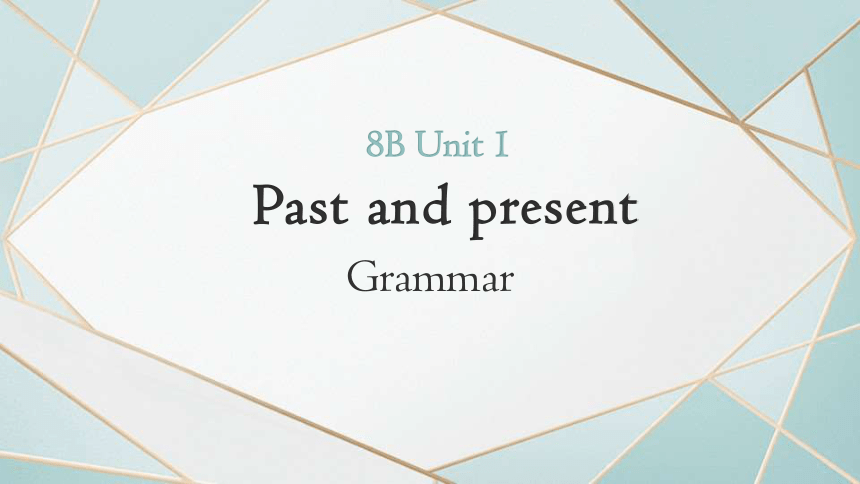 | |
| 格式 | zip | ||
| 文件大小 | 1.2MB | ||
| 资源类型 | 教案 | ||
| 版本资源 | 牛津译林版 | ||
| 科目 | 英语 | ||
| 更新时间 | 2020-05-15 22:48:54 | ||
图片预览

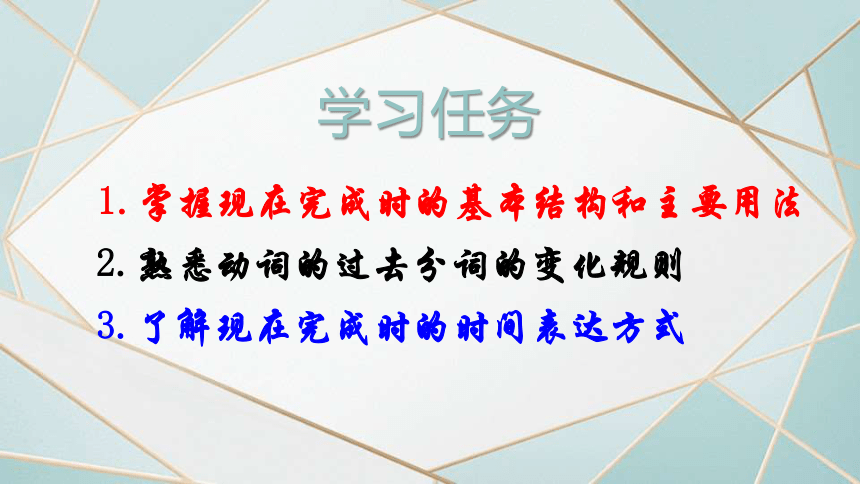


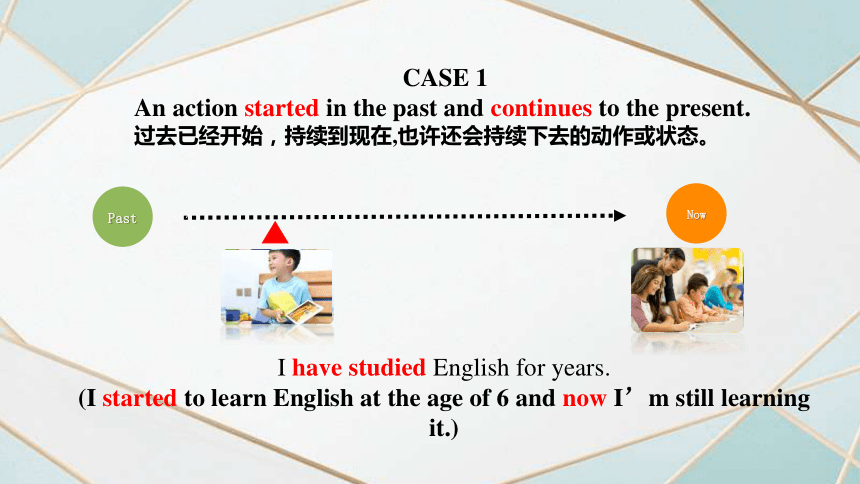
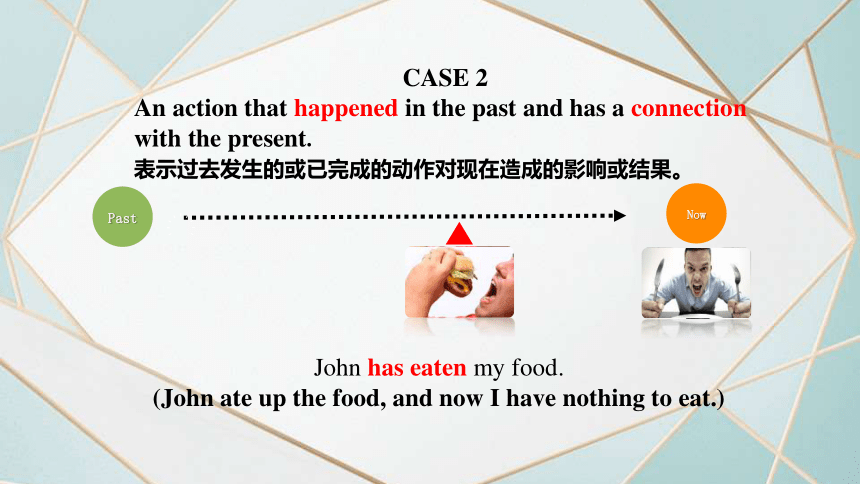
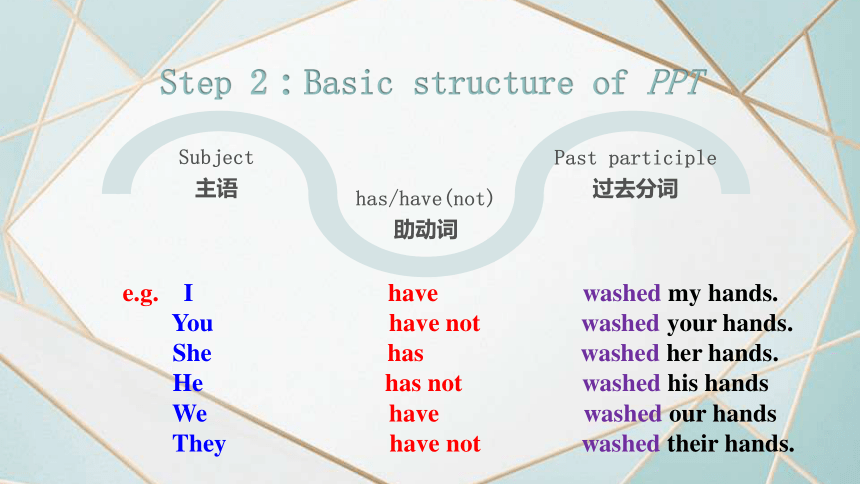
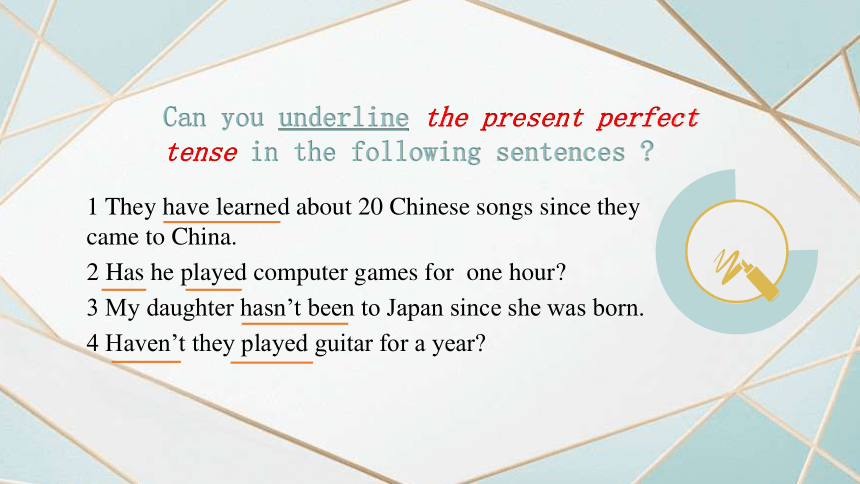

文档简介
(共26张PPT)
Past and present
8B Unit 1
Grammar
学习任务
1.掌握现在完成时的基本结构和主要用法
3.了解现在完成时的时间表达方式
2.熟悉动词的过去分词的变化规则
Step 1:Think & Answer.
Q1
Q2
他拿走了我的书。(一般过去式)
He__________ away my book.
has taken
took
He_____________ away my book.
他拿走了我的书,到现在为止还没归还。
(他拿走了我的书,现在并不确定书是否已经归还?)
When do we need to use the present perfect tense?
CASE 1
An action started in the past and continues to the present.
过去已经开始,持续到现在,也许还会持续下去的动作或状态。
Past
Now
I have studied English for years.
(I started to learn English at the age of 6 and now I’m still learning it.)
CASE 2
An action that happened in the past and has a connection with the present.
表示过去发生的或已完成的动作对现在造成的影响或结果。
Past
Now
John has eaten my food.
(John ate up the food, and now I have nothing to eat.)
Subject
主语
has/have(not)
助动词
Step 2:Basic structure of PPT
Past participle
过去分词
e.g. I have washed my hands.
You have not washed your hands.
She has washed her hands.
He has not washed his hands
We have washed our hands
They have not washed their hands.
Can you underline the present perfect tense in the following sentences ?
1 They have learned about 20 Chinese songs since they came to China.
2 Has he played computer games for one hour?
3 My daughter hasn’t been to Japan since she was born.
4 Haven’t they played guitar for a year?
Step 3: Work out the rule.
Subject
(主语) have / has + (not)
(助动词) past participle
(过去分词)
I/You/We/They have (not) washed.
He/She/It has (not) washed.
I用have,you用have;
has用于he,she,it;
其它复数都用have.
Have/ Has + 主语 + 动词的过去分词…?
Have I/you/we/they washed?
Has he/she/it
Yes, I/you/we/they have.
he/she/it has.
No, I/you/we/they have not/haven’t.
he/she/it has not/hasn’t.
一般疑问句
How can we form the past participle of verbs ?
Step 4:Reflect on my own.
Regular verbs
Irregular verbs
We add ‘-ed’ to regular verbs.
1
2
3
4
Verbs ending in
a consonant + y
- y ied
carry→carried
Most verbs
+ ed
visit→visited
wash→washed
Short verbs ending in
a vowel + a consonant
double the consonant + ed
stop→stopped
Verbs ending in e
+ d
live→lived
change→changed
Test yourself !
原形 过去分词 原形 过去分词
travel visit
move mop
stay finish
own shop
learn solve
travelled
moved
stayed
owned
learned/
learnt
visited
mopped
finished
shopped
solved
What about irregular verbs?
原形 过去式 过去分词
do did done
come came come
see saw seen
hear heard heard
forget forgot forgotten
write wrote written
Please refer to the irregular verbs list on P122
Exercise A on your textbook
borrowed
hoped
made
got
planned
cried
sent
watched
said
grown
hit
enjoyed
Try them yourself!
He has finished his homework.(改为一般疑问句,回答)
______ he _______ his homework?
Yes, he __________. No, he __________________.
2. She has already eaten the apple.(改为一般疑问句)
________ she ________ the apple yet?
Yes, she ________. No, she ___________.
They have taken the old man to the hospital. (改为否定句)
They __________ __________the old man to the hospital.
Has
Has
eaten
has
hasn’t
haven’t
taken
finished
has
hasn’t/has not
Exercise B on your textbook
Mr Wu asks the students to complete the sentences below using the present perfect tense. Help them complete the sentences.
1. They _____________ (finish) their homework already.
2. John ____ never ______ (visit) China.
3. Mr Li ____________ (repair) over ten bicycles since Monday.
4. We ____________ (not see) each other for years.
5. My parents _____________ (not come) back yet.
6. Our teacher __________ (teach) us a lot about the history of China.
have finished
has visited
has repaired
haven’t seen
haven’t come
has taught
有一些时间副词常常出现在现在完成时的句子中表达不一样的意思。
Adverbs of time
already & yet
already一般用于肯定句中。
yet一般用于否定句和 疑问句中。
e.g.
We have already finished our homework.
我们已经完成了作业。
They haven't finished their homework yet.
他们还没完成作业。
*My sister hasn’t returned from Japan_______. (already/yet)
Yes. She has got married __________. (already/yet)
yet
Tip:
“already” 可用在句中或句末.
“ yet” 只用在句末
already
Adverbs of time
ever & never
多用于否定或疑问句中,
表示“曾经”或“从未“等
e.g.
Have you ever watched the World Cup?
你们曾经看过世界杯吗?
I have never watched the World Cup.
我从没看过世界杯。
*Has you grandfather _________ read e-books? (never/ever)
No, he has ________read an e-book. ? (never/ever)
never
ever
Adverbs of time
just & before
用表示到说话时为止的时间状语,
e.g.
I have seen her before, but I can not remember where.
我以前见过她,但记不起在哪里见过。
Lucy has just handed in her homework.
Lucy刚刚已经提交了她的作业。
*I have ____ watched a wonderful film. It’s really interesting.(just/before)
Lily has watched it _______, but she didn’t like it.(just/before)
just
before
Step: 5 Practice makes perfect!
1. I _______________(have) lunch already.
2. Has the train_______________ (arrive), yet?
3.Tom _________ never____________ (be) to China.
4. The twin ________just ________(see) my father.
5. The twins ________(see) my father just now.
have had
arrived
has
been
has
seen
saw
( ) 6. — ___you __a ticket for the football
match?
— Not yet.
A. Is, bought
B. Are, bought
C. Has, bought
D. Have, bought
D
( )7. “Frozen” is a very interesting film.
I ___ it twice already.
A. will see
B. saw
C. see
D. have seen
D
( )8. — Lucy, __ you ___ your ticket?
— Not yet.
A. did, find B. have, found
C. has, found D. do, find
( )9.— What are you going to do this
Saturday?
— I ____ yet.
A. haven’t decided B. won’t decide
C. am not decided D. didn’t decide
B
A
Have seen
saw
have learnt/ learned
have heard
Step 6: Reflection
How well do you think you can do each of the things now?
Give yourself a score from
1: Still need a lot of practice to 5: Feeling very confident about this
In today’s lesson you: 1 2 3 4 5
knew the basic structure of the present perfect tense
can tell why we use the present perfect tense to make statements
thought about the changes of verbs when it comes to their past participles.
practiced doing exercises with the teacher to consolidate what I learned today.
Past and present
8B Unit 1
Grammar
学习任务
1.掌握现在完成时的基本结构和主要用法
3.了解现在完成时的时间表达方式
2.熟悉动词的过去分词的变化规则
Step 1:Think & Answer.
Q1
Q2
他拿走了我的书。(一般过去式)
He__________ away my book.
has taken
took
He_____________ away my book.
他拿走了我的书,到现在为止还没归还。
(他拿走了我的书,现在并不确定书是否已经归还?)
When do we need to use the present perfect tense?
CASE 1
An action started in the past and continues to the present.
过去已经开始,持续到现在,也许还会持续下去的动作或状态。
Past
Now
I have studied English for years.
(I started to learn English at the age of 6 and now I’m still learning it.)
CASE 2
An action that happened in the past and has a connection with the present.
表示过去发生的或已完成的动作对现在造成的影响或结果。
Past
Now
John has eaten my food.
(John ate up the food, and now I have nothing to eat.)
Subject
主语
has/have(not)
助动词
Step 2:Basic structure of PPT
Past participle
过去分词
e.g. I have washed my hands.
You have not washed your hands.
She has washed her hands.
He has not washed his hands
We have washed our hands
They have not washed their hands.
Can you underline the present perfect tense in the following sentences ?
1 They have learned about 20 Chinese songs since they came to China.
2 Has he played computer games for one hour?
3 My daughter hasn’t been to Japan since she was born.
4 Haven’t they played guitar for a year?
Step 3: Work out the rule.
Subject
(主语) have / has + (not)
(助动词) past participle
(过去分词)
I/You/We/They have (not) washed.
He/She/It has (not) washed.
I用have,you用have;
has用于he,she,it;
其它复数都用have.
Have/ Has + 主语 + 动词的过去分词…?
Have I/you/we/they washed?
Has he/she/it
Yes, I/you/we/they have.
he/she/it has.
No, I/you/we/they have not/haven’t.
he/she/it has not/hasn’t.
一般疑问句
How can we form the past participle of verbs ?
Step 4:Reflect on my own.
Regular verbs
Irregular verbs
We add ‘-ed’ to regular verbs.
1
2
3
4
Verbs ending in
a consonant + y
- y ied
carry→carried
Most verbs
+ ed
visit→visited
wash→washed
Short verbs ending in
a vowel + a consonant
double the consonant + ed
stop→stopped
Verbs ending in e
+ d
live→lived
change→changed
Test yourself !
原形 过去分词 原形 过去分词
travel visit
move mop
stay finish
own shop
learn solve
travelled
moved
stayed
owned
learned/
learnt
visited
mopped
finished
shopped
solved
What about irregular verbs?
原形 过去式 过去分词
do did done
come came come
see saw seen
hear heard heard
forget forgot forgotten
write wrote written
Please refer to the irregular verbs list on P122
Exercise A on your textbook
borrowed
hoped
made
got
planned
cried
sent
watched
said
grown
hit
enjoyed
Try them yourself!
He has finished his homework.(改为一般疑问句,回答)
______ he _______ his homework?
Yes, he __________. No, he __________________.
2. She has already eaten the apple.(改为一般疑问句)
________ she ________ the apple yet?
Yes, she ________. No, she ___________.
They have taken the old man to the hospital. (改为否定句)
They __________ __________the old man to the hospital.
Has
Has
eaten
has
hasn’t
haven’t
taken
finished
has
hasn’t/has not
Exercise B on your textbook
Mr Wu asks the students to complete the sentences below using the present perfect tense. Help them complete the sentences.
1. They _____________ (finish) their homework already.
2. John ____ never ______ (visit) China.
3. Mr Li ____________ (repair) over ten bicycles since Monday.
4. We ____________ (not see) each other for years.
5. My parents _____________ (not come) back yet.
6. Our teacher __________ (teach) us a lot about the history of China.
have finished
has visited
has repaired
haven’t seen
haven’t come
has taught
有一些时间副词常常出现在现在完成时的句子中表达不一样的意思。
Adverbs of time
already & yet
already一般用于肯定句中。
yet一般用于否定句和 疑问句中。
e.g.
We have already finished our homework.
我们已经完成了作业。
They haven't finished their homework yet.
他们还没完成作业。
*My sister hasn’t returned from Japan_______. (already/yet)
Yes. She has got married __________. (already/yet)
yet
Tip:
“already” 可用在句中或句末.
“ yet” 只用在句末
already
Adverbs of time
ever & never
多用于否定或疑问句中,
表示“曾经”或“从未“等
e.g.
Have you ever watched the World Cup?
你们曾经看过世界杯吗?
I have never watched the World Cup.
我从没看过世界杯。
*Has you grandfather _________ read e-books? (never/ever)
No, he has ________read an e-book. ? (never/ever)
never
ever
Adverbs of time
just & before
用表示到说话时为止的时间状语,
e.g.
I have seen her before, but I can not remember where.
我以前见过她,但记不起在哪里见过。
Lucy has just handed in her homework.
Lucy刚刚已经提交了她的作业。
*I have ____ watched a wonderful film. It’s really interesting.(just/before)
Lily has watched it _______, but she didn’t like it.(just/before)
just
before
Step: 5 Practice makes perfect!
1. I _______________(have) lunch already.
2. Has the train_______________ (arrive), yet?
3.Tom _________ never____________ (be) to China.
4. The twin ________just ________(see) my father.
5. The twins ________(see) my father just now.
have had
arrived
has
been
has
seen
saw
( ) 6. — ___you __a ticket for the football
match?
— Not yet.
A. Is, bought
B. Are, bought
C. Has, bought
D. Have, bought
D
( )7. “Frozen” is a very interesting film.
I ___ it twice already.
A. will see
B. saw
C. see
D. have seen
D
( )8. — Lucy, __ you ___ your ticket?
— Not yet.
A. did, find B. have, found
C. has, found D. do, find
( )9.— What are you going to do this
Saturday?
— I ____ yet.
A. haven’t decided B. won’t decide
C. am not decided D. didn’t decide
B
A
Have seen
saw
have learnt/ learned
have heard
Step 6: Reflection
How well do you think you can do each of the things now?
Give yourself a score from
1: Still need a lot of practice to 5: Feeling very confident about this
In today’s lesson you: 1 2 3 4 5
knew the basic structure of the present perfect tense
can tell why we use the present perfect tense to make statements
thought about the changes of verbs when it comes to their past participles.
practiced doing exercises with the teacher to consolidate what I learned today.
